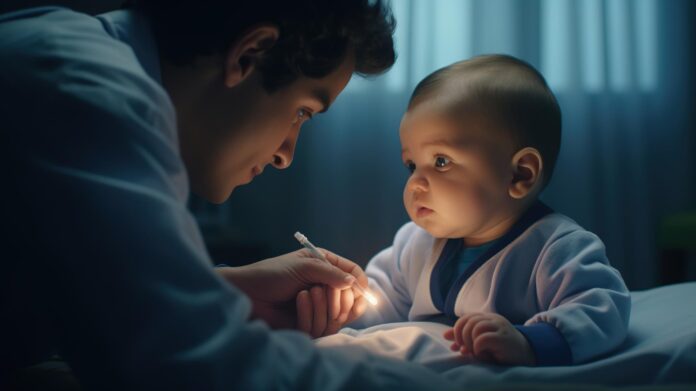According to research from the University of Birmingham, babies as young as four months old can understand how their bodies interact with the space around them. Published in Scientific Reports, the Birmingham BabyLab study showed babies a moving ball on a screen. When the ball approached them on the screen, the babies felt a ‘touch’ (a slight vibration) on their hands. Brain activity measurements revealed enhanced sensory processing in babies as young as four months when a touch followed an object moving towards them.
Dr. Giulia Orioli, Research Fellow in Psychology at the University of Birmingham, who led the study, said: “Our findings indicate that even in the first few months of life before babies have even learned to reach for objects, the multisensory brain is wired up to make links between what babies see and what they feel. This means they can sense the space around them and understand how their bodies interact with that space. This is sometimes referred to as peripersonal space.”
As adults, we use our senses to understand our position in space and predict when we’ll touch something. Research shows that even babies as young as four months start exhibiting these abilities. This raises questions about whether these skills are learned or innate in early development. In another part of the study, eight-month-old babies showed signs of surprise in their brain activity when a touch followed the ball on the screen moving away from them.
Professor Andrew Bremner, a specialist in Developmental Psychology, noted that the surprise responses in older babies suggest they are constructing a more sophisticated awareness of their body in space. The researchers plan to extend the study with younger and older participants, using adult research to understand the brain activity infants are progressing towards. Additionally, they aim to investigate if newborns display early signs of these ‘multisensory’ abilities.
Dr. Orioli concluded: “It is a challenge working with newborns, as they spend such a large portion of their time sleeping and eating, but we are starting to have some success working with this age group, and it is going to be fascinating to see if babies only a few days old have the foundations of a sense of their bodies in space. If so, we could be looking at the origins of human consciousness.”
This study contributes valuable insights into the early emergence of self-awareness in infants, challenging previous assumptions and opening avenues for further research. The findings have implications for understanding cognitive development in the early stages of life. They may have an impact on future studies on cognitive processes in infants.
Journal reference:
- Orioli, G., Parisi, I., van Velzen, J.L. et al. Visual objects approaching the body modulate subsequent somatosensory processing at 4 months of age. Scientific Reports. DOI: 10.1038/s41598-023-45897-4.
